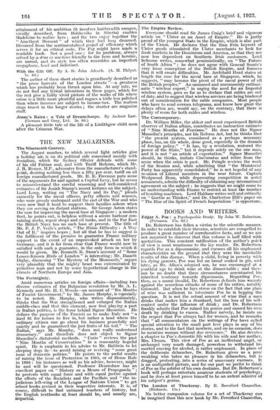BOOKS AND WRITERS.
Edgar A. Poe : a Psychopathic Study. By John W. Robertson. (Putnams. 17s. ad.) Dr. Robertson has fallen a victim to the scientific manner. In order to establish their theories, scientists arc compelled to produce a great number of corroborative facts, and so we are not surprised to discover that this volume is half filled with quotations. This constant ratification cf the author's point of view is most wearisome to the lay reader. Dr. Robertson regards Poe as a dipsomaniac, and excuses all his unpleasant characteristics on the ground that they were the inevitable results of this disease. When a child, living in poverty with his dying parents, Poe was fed on bread soaked in gin, and later, as Mr. Allan's adopted son, he was encouraged at a youthful age to drink wine at the dinner-table ; and there can be no doubt that these circumstances accentuated his inherited tendency towards dipsomania. Regarding Poe, then, as a moral invalid, Dr. Robertson defends him warmly against the scurrilous attacks of some of his critics, notably Griswold. But when he lays stress on the fact that one glass of wine wa.s sufficient to intoxicate Poe he is begging the question. It is not the actual amount of wine that a man drinks that makes him a drunkard, but the loss of his self- control under the influence of drink ; and Dr. Robertson frankly admits that Poe ruined his genius and caused his own death by drinking to excess. Rather naively, he insists on the respect that Poe always had for women, and he remarks that " all commentators on the writings of Poe have called special attention to the small part love plays in any of his stories, and to the fact that nowhere, and on no occasion, does he mention woman without due reverence." He also devotes a chapter to Poe's domestic life with his wife and her mother, Mrs. Clernm. This view of Poe as an ineffectual angel, or archangel very much damaged, powerless to withstand his morbid craving for alcohol, is rather unpleasant. In place of the deliberate debauchee, Dr. Robertson gives us a poor weakling who takes no pleasure in his debauches, but is dragged, protesting, into a series of unsavoury excesses. It is an undignified picture, and for our part we prefer to think of Poe as the arbiter of his own destinies. But Dr. Robertson's book will perhaps entertain amateur students of psychology, and he does at least prove himself to be an ardent admirer of his subject's genius.


































 Previous page
Previous page